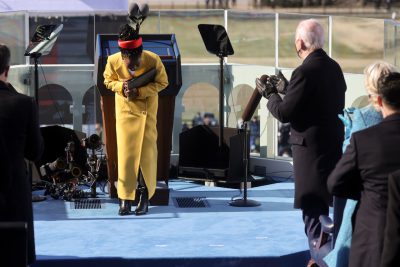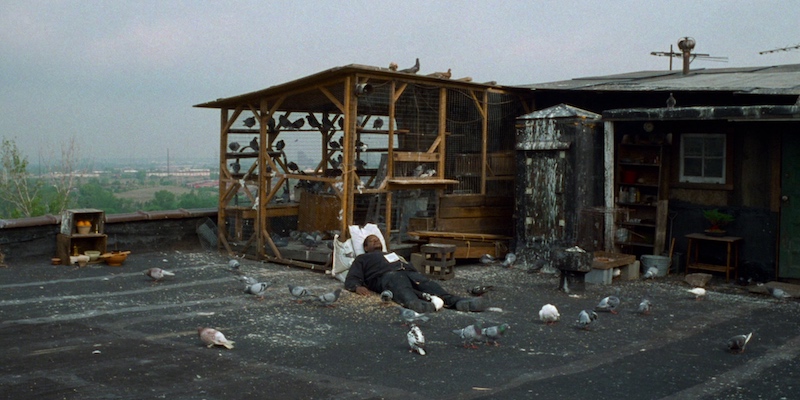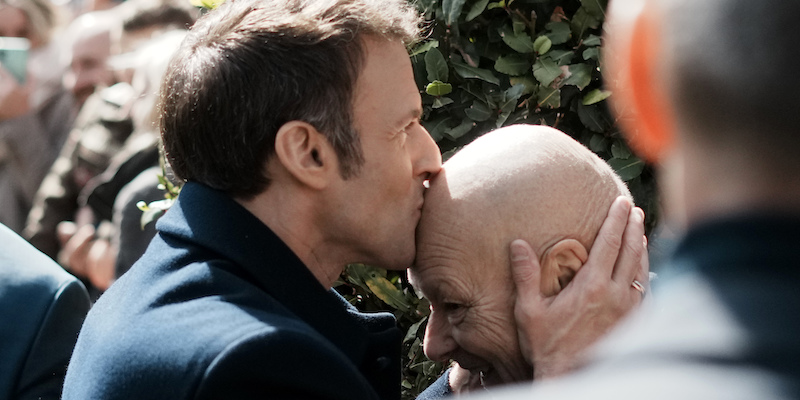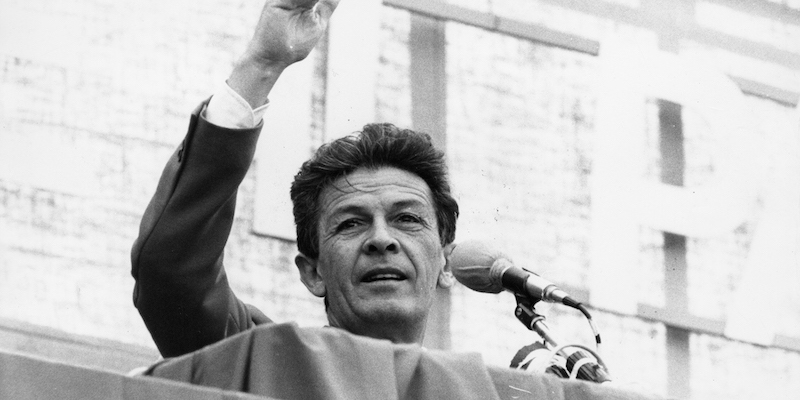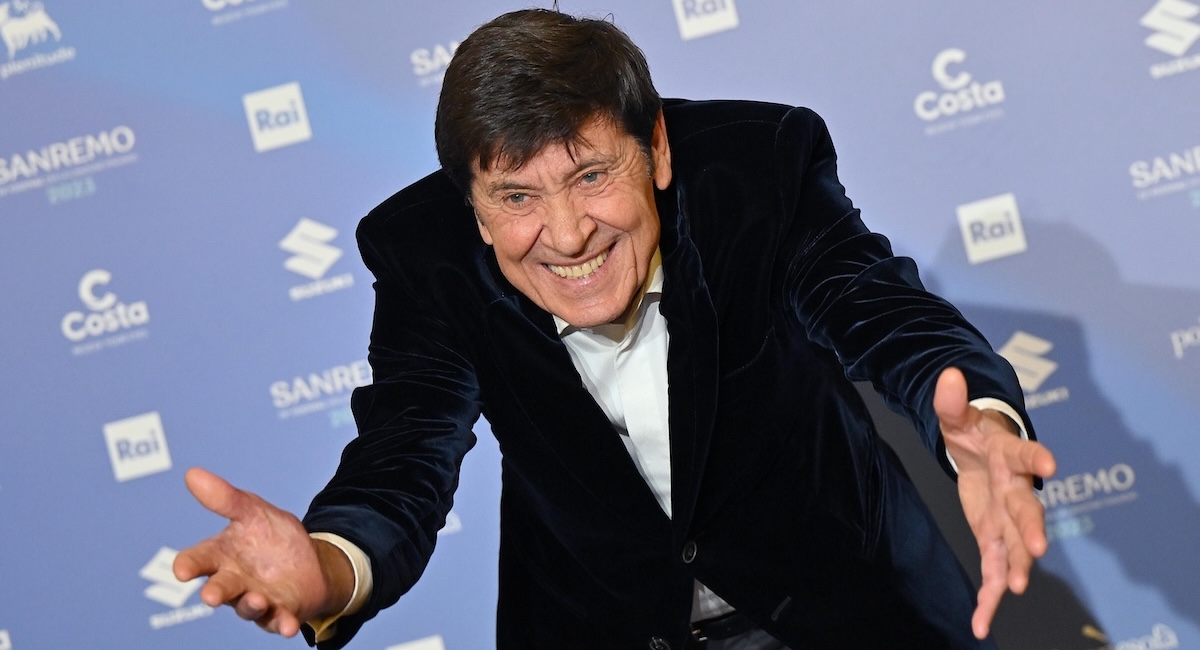Chi è Amanda Gorman, la poeta dell’insediamento
Ha 22 anni, è di Los Angeles ed è piaciuta non solo per la poesia ma anche per come l'ha letta e per cosa indossava
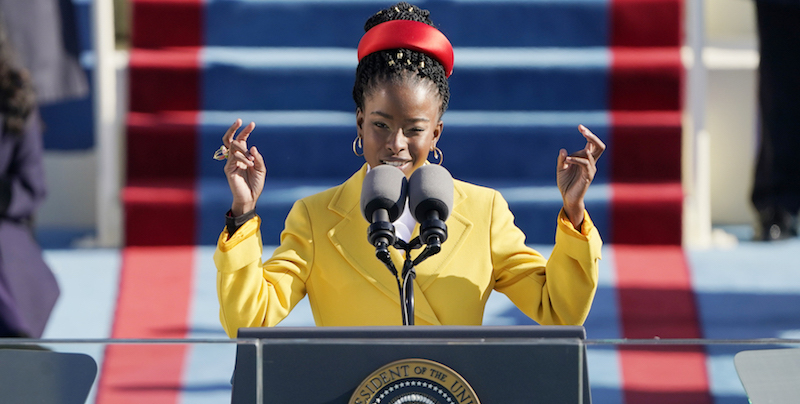
altre
foto
Amanda Gorman è una poeta afroamericana di 22 anni di cui, da ieri, stanno parlando i giornali e i social network di mezzo mondo. Ha provocato l’ammirazione di molti grazie alla lettura, sicura di sé e piena di grazia, di una sua poesia durante la cerimonia di insediamento alla presidenza di Joe Biden. Gorman si è esibita in qualità di National Youth Poet Laureate, cioè in quanto Giovane poeta laureata americana, la prima a ricevere la carica, nel 2017. I poeti laureati sono nominati dal bibliotecario del Congresso degli Stati Uniti e sono considerati i poeti ufficiali della nazione; ricevono un piccolo salario e devono presenziare ad alcune cerimonie ufficiali.
On a day for the history books, @TheAmandaGorman delivered a poem that more than met the moment. Young people like her are proof that "there is always light, if only we're brave enough to see it; if only we're brave enough to be it." pic.twitter.com/mbywtvjtEH
— Barack Obama (@BarackObama) January 20, 2021
La poesia di Gorman si intitola The Hill We Climb ed è stata appositamente composta per l’occasione: è un invito e una speranza che il paese, spaccato e polarizzato, si riconcili e prosegua versa la strada di “a more perfect union”, un’unione più compiuta, come disse l’ex presidente Barack Obama in un suo famoso discorso. Proprio Obama ha scritto su Twitter che la poesia risponde perfettamente al momento. «Nella mia poesia – ha spiegato Gorman al New York Times – non cerco minimamente di sorvolare su quello che abbiamo visto nelle scorse settimane e, oserei dire, negli ultimi anni. Quello a cui aspiro è usare le mie parole per suggerire una strada che unifichi il paese e che lo aiuti a guarire. Cerco di farlo in un modo che non cancelli o neghi le aspre verità con cui, penso, l’America debba fare i conti».
– Leggi anche: Le foto dell’insediamento di Joe Biden
Gorman era stata contattata il mese scorso dal comitato incaricato di organizzare la cerimonia. Il suo nome era stato suggerito da Jill Biden, la moglie del presidente, che era rimasta colpita dalla lettura che Gorman aveva fatto della sua poesia In This Place: An American Lyric alla Biblioteca del Congresso, nel 2017 (qui ne trovate altre cinque). Non c’erano particolari richieste e temi da seguire per la composizione del testo, a parte quello generale dell’unione americana, caratteristico di tutte le cerimonie di insediamento.
Gorman si era messa subito al lavoro, ispirandosi ai grandi discorsi dei leader americani che avevano guidato il paese nei momenti di discordia, come Abraham Lincoln e Martin Luther King, e alle opere di poeti laureati del passato, come Robert Frost, Maya Angelou, Elizabeth Alexander e Richard Blanco. Aveva buttato giù qualche verso, poi arrivò il 6 gennaio, il giorno in cui un gruppo di sostenitori di Donald Trump prese d’assalto il Campidoglio. Gorman rimase sveglia fino a tardi e concluse la poesia, raccontando quegli eventi in alcuni versi:
«We’ve seen a force that would shatter our nation rather than share it,
Would destroy our country if it meant delaying democracy.
And this effort very nearly succeeded.
But while democracy can be periodically delayed,
It can never be permanently defeated.»«Abbiamo visto una forza che vorrebbe frantumare la nostra nazione anziché armonizzarla
che potrebbe distruggere il nostro paese sospendendo la democrazia.
E ci è quasi riuscita
Ma se la democrazia può essere periodicamente rimandata
non può essere sconfitta per sempre».
Nel testo accenna anche al ruolo degli Stati Uniti nel mondo e insiste sulla riconciliazione del paese:
«And yet the dawn is ours before we knew it.
Somehow, we do it.
Somehow, we’ve weathered and witnessed
A nation that isn’t broken, but simply unfinished»«Eppure l’alba è nostra prima di accorgercene
In qualche modo, ce la faremo
In qualche modo siamo rimasti in piedi e abbiamo assistito
a una nazione che non è spezzata, ma semplicemente non conclusa».
Gorman termina con un augurio di speranza che è insieme un’esortazione:
«For there is always light,
if only we’re brave enough to see it.
If only we’re brave enough to be it.»«Perché c’è sempre luce
se siamo abbastanza coraggiosi da vederla
se siamo abbastanza coraggiosi da incarnarla».
Nella poesia Gorman accenna anche alla sua storia personale, definendosi «a skinny Black girl descended from slaves and raised by a single mother can dream of becoming president, only to find herself reciting for one» (una ragazzina nera e ossuta, discendente da schiavi, cresciuta da una madre single che può sognare di diventare presidente un giorno, per poi ritrovarsi a declamare versi per uno»). Nata a Los Angeles nel 1998, fu cresciuta dalla madre, maestra di scuola media; già da piccola scriveva nei suoi diari e sognava di diventare una poeta; a 16 anni venne scelta come poeta laureata della città e tre anni dopo ricevette l’incarico a livello nazionale, mentre studiava sociologia all’università di Harvard.
Gorman, oltre che per le sue parole, è piaciuta anche per come ha saputo presentarsi, nell’esibizione e nella scelta dei vestiti che indossava. Ha recitato la poesia con ritmo e sicurezza, un’abilità che ha acquisito dovendo combattere sin da piccola con una difficoltà a parlare, cosa che la avvicina al presidente Biden che da bambino era balbuziente: «questo – ha raccontato al Los Angeles Times – mi ha reso la perfomer che sono e la cantastorie che vorrei essere».
La sua figura è stata resa più luminosa da un cappotto giallo di Prada, un omaggio a Jill Biden che l’aveva scelta e che le aveva raccontato di aver visto «un tuo video: eri vestita di giallo, mi piaceva tantissimo». In un contrasto brillante, Gorman indossava un cerchietto rosso, non schiacciato sul capo ma ad avvolgerle i capelli; anche questo era di Prada, un’azienda che le piace molto per lo stile intellettuale e le posizioni femministe.
Per finire, gli orecchini e l’anello erano un regalo della conduttrice Oprah Winfrey, una sua ammiratrice. Winfrey l’aveva chiamata per chiederle se poteva proseguire la tradizione di regalarle qualcosa che avrebbe indossato all’insediamento, come aveva fatto nel 1993 per la grande poeta afroamericana Maya Angelou, inviandole un cappotto di Chanel e un paio di guanti. L’anello riproduceva una gabbietta per uccelli ed era un richiamo al libro autobiografico di Angelou, I Know Why the Caged Bird Sings.
– Leggi anche: 15 consigli da Maya Angelou
L’esibizione oltre ad accrescere la notorietà di Gorman favorirà anche la vendita dei suoi libri: il primo, The One for Whom Food Is Not Enough, è del 2015, mentre a settembre usciranno la sua prima raccolta di poesie The Hill We Climb, che includerà anche quella per l’insediamento, e Change Sings, un libro di poesie per bambini illustrato. In primavera la casa editrice Penguin Young Readers pubblicherà un’edizione della sola poesia inaugurale con una tiratura iniziale di 150mila copie; uscirà anche in Italia con Garzanti.
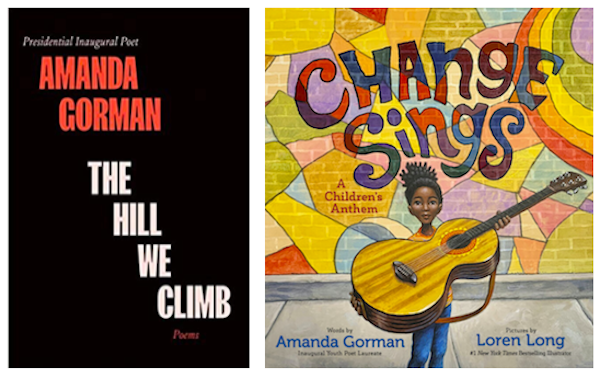
The Hill We Climb
When day comes, we ask ourselves where can we find light in this never-ending shade?
The loss we carry, a sea we must wade.
We’ve braved the belly of the beast.
We’ve learned that quiet isn’t always peace,
and the norms and notions of what “just” is isn’t always justice.
And yet, the dawn is ours before we knew it.
Somehow we do it.
Somehow we’ve weathered and witnessed a nation that isn’t broken,
but simply unfinished.
We, the successors of a country and a time where a skinny Black girl descended from slaves and raised by a single mother can dream of becoming president, only to find herself reciting for one.And yes, we are far from polished, far from pristine,
but that doesn’t mean we are striving to form a union that is perfect.
We are striving to forge our union with purpose.
To compose a country committed to all cultures, colors, characters, and conditions of man.
And so we lift our gazes not to what stands between us, but what stands before us.
We close the divide because we know, to put our future first, we must first put our differences aside.
We lay down our arms so we can reach out our arms to one another.
We seek harm to none and harmony for all.
Let the globe, if nothing else, say this is true:
That even as we grieved, we grew.
That even as we hurt, we hoped.
That even as we tired, we tried.
That we’ll forever be tied together, victorious.
Not because we will never again know defeat, but because we will never again sow division.Scripture tells us to envision that everyone shall sit under their own vine and fig tree and no one shall make them afraid.
If we’re to live up to our own time, then victory won’t lie in the blade, but in all the bridges we’ve made.
That is the promise to glade, the hill we climb, if only we dare.
It’s because being American is more than a pride we inherit.
It’s the past we step into and how we repair it.
We’ve seen a force that would shatter our nation rather than share it.
Would destroy our country if it meant delaying democracy.
This effort very nearly succeeded.
But while democracy can be periodically delayed,
it can never be permanently defeated.
In this truth, in this faith, we trust,
for while we have our eyes on the future, history has its eyes on us.
This is the era of just redemption.
We feared it at its inception.
We did not feel prepared to be the heirs of such a terrifying hour,
but within it, we found the power to author a new chapter, to offer hope and laughter to ourselves.
So while once we asked, ‘How could we possibly prevail over catastrophe?’ now we assert, ‘How could catastrophe possibly prevail over us?’We will not march back to what was, but move to what shall be:
A country that is bruised but whole, benevolent but bold, fierce and free.
We will not be turned around or interrupted by intimidation because we know our inaction and inertia will be the inheritance of the next generation.
Our blunders become their burdens.
But one thing is certain:
If we merge mercy with might, and might with right, then love becomes our legacy and change, our children’s birthright.So let us leave behind a country better than the one we were left.
With every breath from my bronze-pounded chest, we will raise this wounded world into a wondrous one.
We will rise from the golden hills of the west.
We will rise from the wind-swept north-east where our forefathers first realized revolution.
We will rise from the lake-rimmed cities of the midwestern states.
We will rise from the sun-baked south.
We will rebuild, reconcile, and recover.
In every known nook of our nation, in every corner called our country,
our people, diverse and beautiful, will emerge, battered and beautiful.
When day comes, we step out of the shade, aflame and unafraid.
The new dawn blooms as we free it.
For there is always light,
if only we’re brave enough to see it.
If only we’re brave enough to be it.
